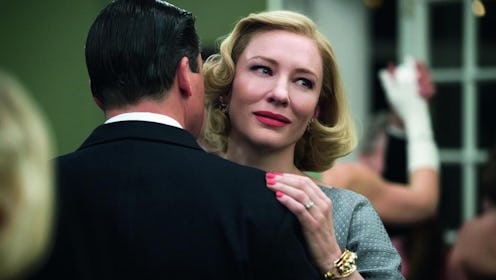
Whenever a piece of mail comes to my house addressed to Mr. and Mrs. HisLastName, I toss the envelope at my husband. "Here, something came for your parents," I usually say with a scowl. He always looks confused, before giving the label a glance and realizing that Mr. and Mrs. HisLastName is supposed to be us. I've always hated the assumption that all women take their husband's last names upon marriage. I have absolutely no issue with women who choose to do so, but the assumption that I am now "his" in everything, including my name, angers me. It's even worse when something is addressed to Mrs. HisFirstName HisLastName, as if I do not have a name at all and have been absorbed into his identity — which is why it's so refreshing that Carol , the stunning, '50s-set lesbian romance drama starring Cate Blanchett and Rooney Mara, goes to lengths to emphasize the importance of getting women's names right.
Directed by Todd Haynes, the film, in theaters now, elegantly weaves subtle feminism throughout the love story between the titular character, played by Blanchett, and lonely shop girl Therese, played by Mara. As a whole, the movie rejects typical 1950s gender roles for women. Therese drinks beer and hangs out with guys, while Carol, though lavishly dressed in chic fashion of the period, frequently whips her hands through her hair, not in a glamourous gesture of vanity but as though she's attempting to loosen her restrictive style. Then there's the way in which the two first meet; while Carol is shopping for a doll to give her daughter for Christmas, Therese instead suggests a more "boyish" electric train set, the same toy she had always wanted as a child. Carol buys it.
Small challenges to femininity like these are invigorating, but the repeated emphasis on names is where Carol hits its modern stride. Early in the film, Carol's husband Harge, played by a wonderfully charming yet imposing Kyle Chandler, relays a hello from Carol's friend, "Sy Harrison's wife." "Jeanette," Carol interrupts him, repeating the woman's name, not only so that he knows it, but also so he knows how she feels about a woman's identity being solely tied to her husband's. Judging from the time period and Harge's personality, it's reasonable to assume that he knows the woman's name is Jeanette, but that he refers to her as Sy Harrison's wife because he considers her husband far more important.
When Carol and Therese have their first lunch, Therese explains that her name is pronounced in the standard French way, Teh-REZ, rather than the Anglicized Theresa. Carol pronounces her name correctly and lovingly throughout the rest of film, despite numerous other characters' inability to do so. Even Therese's boyfriend can't get her name right. He Calls her Terry, ignoring the squirm on her face each time he does. Yet there's no question where the film itself stands on the matter; its name is a red stamp of conclusion. Though Blanchett's character is called Mrs. Aird the majority of the time, the film's title screams, "This story is about Carol."
Though Carol takes place in the 1950s, a period in which many women were beholden to their husbands both legally and emotionally, the film's emphasis on addressing women as they choose is a continuous modern issue. This applies not only when it comes to names taken upon marriages, but also for women in the workforce wanting to be addressed correctly, and transgender people fighting for legal recognition of their preferred names.
And progress is being made. With regards to marriage, the presumption has definitely been changing in recent times, and more people seem to be accepting that whether someone decides to change their name upon wedding is their decision, only. Changing your name doesn't make someone less of a feminist, and many men, celebrities included, have jumped on the bandwagon to take their wives' names, instead. This freedom is a luxury Carol and millions of women throughout history haven't had, and it's still a conversation worth having today.
One thing that should cease to exist, however, is the assumption that most women will still choose to take their husbands' last names, as my mail experience has shown. Occasionally, that envelope lacking any mention of me happens to be an invitation, and in such a case, I make it a point to RSVP using both mine and my husband's full names. Hopefully, the next time someone sends my husband and me a mailing, I won't be forgotten.
Images: The Weinstein Company (2); Giphy